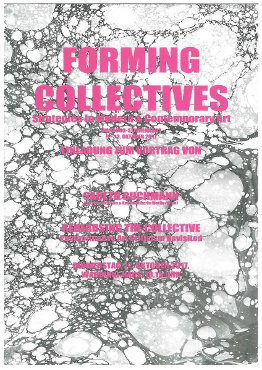Journal

Forming Collectives
CfP: Forming Collectives: Strategies in Modern and Contemporary Art
Workshop 2017, Petra Lange-Berndt, Isabelle Lindermann
Since the nineteenth century a multitude of artists have been experimenting with forms of collective work, habitation in colonies and communes, or group-orientated activism. In a post-communist world these projects are taken up again and revisited within contemporary practices. In this workshop we would like to ask: How is the desire to speak in a collective voice relevant today? Under what conditions does the need to organise in collaborative structures occur and what kind of dynamics are being produced? What does it mean to speak together on a commonly shared platform, to assemble as a group, cooperative, commune, network, sect, horde, pack, or swarm? And how are artists enacting change and proposing alternative ways of being in the world?
Collective actions are closely connected to a critique of the ‘new spirit of capitalism’ (Boltanski / Chiapello) and current crises. In this experimental field, through the fusion of art and activist strategies, social relations can be investigated exemplarily - with actual consequences (Bourriaud / Bishop). At times these processes strengthen the institutions that control events and gain the symbolic capital of increased attention. More productive case studies, however, are investigating if and how one can escape or redesign the digital networks of post-Fordist societies or the neoliberal concept of the Ikea Family. We would therefore also like to assemble and debate the historic and current meanings that are connected to collective and collaborative
artistic strategies. Is there an afterlife of the utopian concepts of the early avant-gardes? How have these concepts been adapted under current capitalism? What kind of many-handed practices can be described and how do they work? How do the bodies assembling in collective alliances have critical potential (Butler)? How can one describe the psychological aspect of being with, the processes of becoming a community (Nancy)? Is it possible to form collectives that are functioning as a plurality but where the ‘we’ is not acting as a totality? Are collectives at all suitable to oppose power structures in the expanded field of the arts and beyond? And what does this mean for the practices of art and art history?
This workshop is directed towards PhD students, postdocs and emerging scholars who wish to discuss their current academic and / or artistic research. Please send a CV, an abstract of c. 350 words for a possible talk or artists’ contribution and your estimated travel costs to petra.lange-berndt@uni-hamburg.de and isabelle.lindermann@uni-hamburg.de. The workshop will take place at the Warburg Haus Hamburg, Germany (http://www.warburg-haus.de), and papers will be in
German and English (you do not have to speak German in order to apply). We can contribute towards travel costs and pay for accommodation in Hamburg in full. The deadline is the 2nd May 2017; we will notify participants by mid-May.
Prof. Dr. Petra Lange-Berndt
Kunstgeschichtliches Seminar
Universität Hamburg
Edmund-Siemers-Allee 1